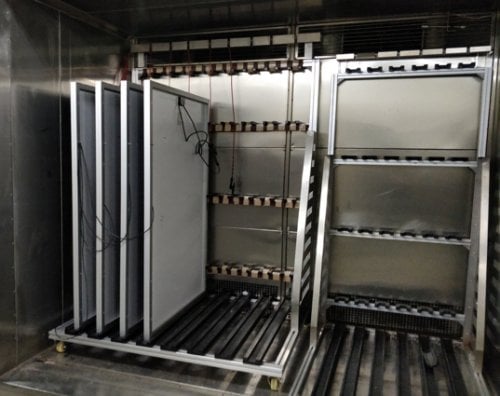Humidity Freeze HF 10 Testing for Solar Modules
Perform Humidity Freeze HF 10 Testing on solar modules at our Accredited PV Laboratory.
What is Humidity Freeze HF 10 Test ?
The humidity freeze HF 10 test is an environmental test that is designed to define the module's ability to endure the effects of high temperatures combined with humidity, then followed by very low temperatures. The module is exposed to 10 complete cycles in a harmonized profile. HF 10 is defined as an environmental stress test used to evaluate the reliability of the material or the product and to identify any early manufacturing defects by inducing failure modes through the thermal fatigue. It is one of the main qualifying tests carried out on PV modules in order to qualify them for IEC 61215 certification.
Why we do Humidity Freeze HF 10 testing on PV modules?
After the manufacturing of a high power photovoltaic (PV) module, the most critical feature is the duration for which the PV module can produce useful power. The reliability and lifetime of photovoltaic modules are key factors that define system performance and warranty. Outdoor field testing can provide an accurate method for module lifetime estimation. Yet, testing PV modules outdoor in the field for long periods reaching 25 years is not feasible. Therefore, due to time constraints and limitations, many accelerating aging tests have been developed over the years for testing the reliability of PV modules. Humidity Freeze HF 10 is one of those tests.
The Humidity Freeze HF 10 test provides accelerated aging simulation of produced PV modules. As a result it is possible to determine the performance of PV modules for several years of operation under different weather conditions. This is done by determining the ability of the module to withstand the effects of really high temperature and high humidity directly followed by sub-zero temperatures. The purpose of the test is to determine the ability of the PV module to withstand against humidity penetration at extreme temperatures.
How the Humidity Freeze Test of PV modules is carried out?
Humidity Freeze HF 10 test is performed according to IEC 61215. PV modules are exposed to cycles ranging between temperatures of 85°C with relative humidity of nearly 85 % and negative temperature reaching - 40°C. PV modules are subjected to a total of 10 complete cycles in a closed climatic chamber.
What defects or problems can Humidity Freeze HF 10 test detect?
Humidity Freeze HF 10 testing can give useful information about forecasted aging of PV modules - which is the deterioration of performance of PV modules over time. Accelerated aging tests like the Humidity freeze testing can be used to test the durability and safety of manufactured PV modules.
Humidity Freeze HF 10 test is considered an environmental stress test for cell connectors due to problems that can arise from the different thermal coefficients of glass, Si and copper. One of the main failure causes is the Thermo-mechanical stress.
The failure mechanism that can be induced by thermo-mechanical stress is that the PV modules – which combine different materials that have different coefficients of thermal expansion (the glass cover, polymeric encapsulation, solar cells, back sheet, metal parts of internal wiring) – may suffer from degradation processes originating from thermomechanical stresses induced to the interconnects (cyclic movement of cells) which cause loss of adhesion strength at interfaces and subsequent losses in the generated power and decrease in lifetime of the module.


